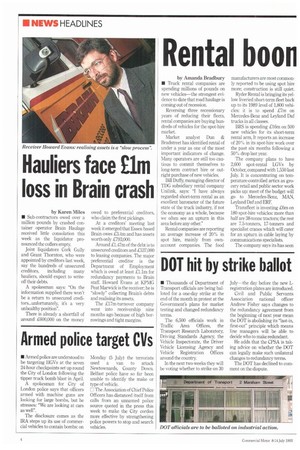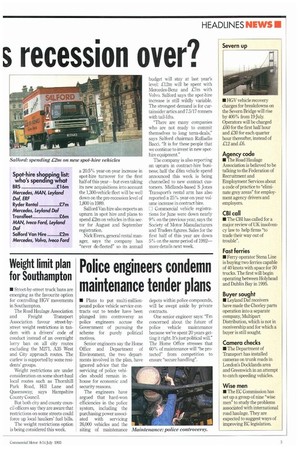Rental boon s recession over?
Page 6

Page 7

If you've noticed an error in this article please click here to report it so we can fix it.
by Amanda Bradbury • Truck rental companies are spending millions of pounds on new vehicles—the strongest evidence to date that road haulage is coming out of recession.
Reversing three recessionary years of reducing their fleets, rental companies are buying hundreds of vehicles for the spot-hire market.
Market analyst Dun & Bradstreet has identified rental of under a year as one of the most important indicators of change. Many operators are still too cautious to commit themselves to long-term contract hire or outright purchase of new vehicles.
Bill Duffy managing director of TDG subsidiary rental company Unilink, says: "I have always regarded short-term rental as an excellent barometer of the future state of the truck industry, if not the economy as a whole, because we often see an upturn in this area before any other."
Rental companies are reporting an average increase of 20% in spot hire, mainly from owna(-cont companies. The food manufacturers are most commonly reported to be using spot hire more; construction is still quiet.
Ryder Rental is bringing its yellow liveried short-term fleet back up to its 1989 level of 1,800 vehicles: it is to spend £7m on Mercedes-Benz and Leyland Daf trucks in all classes.
BRS is spending £16m on 500 new vehicles for its short-term rental arm, It reports an increase of 20% in its spot-hire work over the past six months following a 50% drop last year.
The company plans to have 2,600 spot-rental LGVs by October, compared with 1,550 last July. It is concentrating on temperature-controlled attics as grocery retail and public sector work picks up: most of the budget will go to Mercedes-Benz, MAN, Leyland Daf and ERF.
Transfleet is investing £6m on 180 spot-hire vehicles: more than half are 38-tonne tractors; the rest are 7.5-tonners, 17-tonners and specialist cranes which will cater for an upturn in cable laying by communications specialists.
The company says its has seen a 20.5% year-on-year increase in spot-hire turnover for the first half of this year—but even taking its new acquisitions into account the 1300-vehicle fleet will be well down on the pre-recession level of 1,800 in 1989.
Salford Van hire also reports an upturn in spot hire and plans to spend 1.2m on vehicles in this sector for August and September registration.
Nick Evers, general rental manager, says the company has "never de-fleeted" so its annual budget will stay at last year's level: £12m will be spent with Mercedes-Benz and Om with Volvo. Salford says the spot-hire increase is still wildly variable. The strongest demand is for curtainsider artics and 7.5/17-tonners with tail-lifts.
"There are many companies who are not ready to commit themselves to long term-deals," says Salford chairman Raffaello Bacci. "It is for these people that we continue to invest in new spothire equipment."
The company is also reporting an upturn in contract-hire business; half the £6m vehicle spend announced this week is being channelled to new contract customers. Midlands-based S Jones Transport's rental arm has also reported a 25% year-on-year volume increase in contract hire.
L-] Commercial vehicle registrations for June were down nearly 9% on the previous year, says the Society of Motor Manufacturers and Traders figures. Sales for the first half of this year are down 5% on the same period of 1992— more details next week.




















































































